Fossa alterna for household sanitation Arba Minch, Ethiopia - Case study of sustainable sanitation projects
Shewa, W., Geleta, B. (2010)

Published in: 2010
Publisher:
Sustainable Sanitation Alliance (SuSanA)
Author:
Shewa, W., Geleta, B.
Uploaded by:
SuSanA secretariat
Partner profile:
common upload
15033 Views
300 Downloads
Location of library entry
Content - Summary
This case study is about the Fossa alterna as resource-oriented household sanitation in Arba Mich, one of the fastest growing towns in Ethiopia. The project has been realised within the ROSA (Resource-Oriented Sanitation concepts for peri-urban areas in Africa) project which aims to develop adaptable, affordable and replicable sanitation solutions in Africa. In total, 30 fossa alterna were built, covering 177 inhabitants. The total investment was 2600 euros. The project was planned and executed by the Arba Minch Town Water Supply and Sewerage Enterprise (ARB) and Arba Minch University (AMU), with Jupiter construction micro and small enterprise and Daylight construction micro and small enterprise. The project had the support from the European Union (EU).
Since its inception in October 2006, the ROSA project has introduced different resource oriented sanitation systems that include three types of toilets, greywater treatment units, a biogas unit and composting schemes. At the moment there are 15 urine diversion dehydration toilets (UDDTs), 30 Fossa alternas, 9 Arborloos, 9 greywater towers, 1 biogas unit and more than 5 composting schemes. In this case study Fossa alternas are described. It is a double pit compost toilet and is made up of six parts (Morgan, 2007): two pits, two ring beams to protect the two pits, a single concrete slab which sits on one of the ring beams and the toilet house which provides privacy. In this type of toilet urine is not separated from faeces. The Fossa alterna is one sanitation option which is easy and affordable for many inhabitants of Arba Minch. Such construction would provide improved sanitation in places facing problems with rocky ground and pit collapsing as is the case in central parts of town.
The absence of credit facilities for households which are interested to construct the demonstrated innovative toilet options has constrained efforts for further scaling-up of the implementation. The project has recently worked to generate seed money from other sources with a 50 % grant scheme from the Dutch government and 50 % loan arrangements to facilitate credit access to households who are willing to construct the toilets. The total amount of money is about one million Euro and this money will be used as a revolving fund.
In Fossa alternas the contents of the filled pit can be emptied easily and applied in the compound of the household as compost. If there is no space for applying this compost in the household’s compound it will be collected by solid waste collectors. The feedback from the users indicates that using the compost in the compound is the best option. Compared to the other types of resource oriented toilets tested in Arba Minch the Fossa alterna has been accepted to a larger extent. The main reason is the similarity of the toilet to the traditional toilet. Adaptations on design were made upon users’ request.
Bibliographic information
Shewa, W., Geleta, B. (2010). Fossa alterna for household sanitation Arba Minch, Ethiopia - Case study of sustainable sanitation projects. Sustainable Sanitation Alliance (SuSanA)
Filter tags
Case studies in SuSanA template Composting, vermicomposting (solid waste), composting toilets English Faeces or faecal sludge Peri-urban Sub-Saharan Africa















